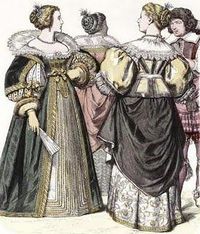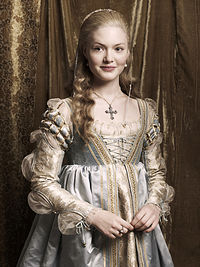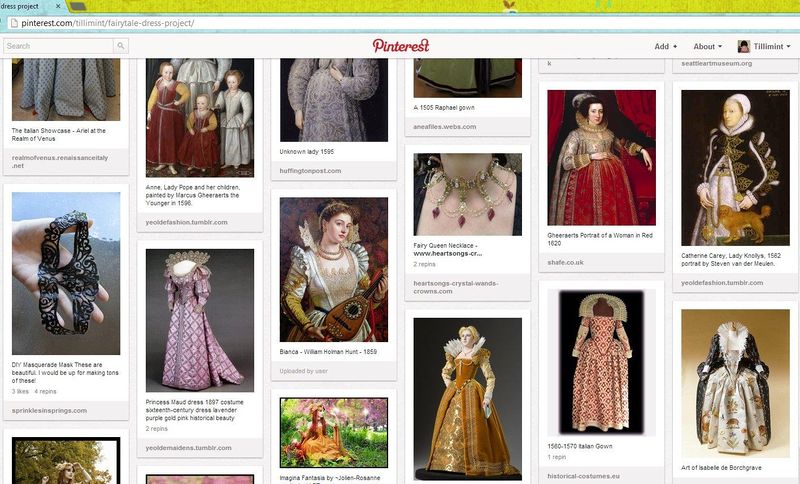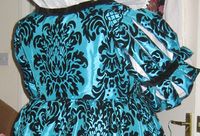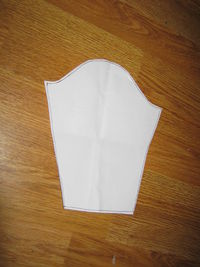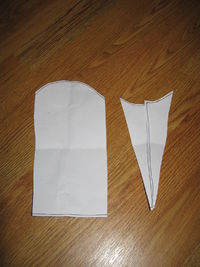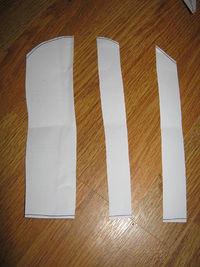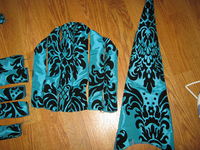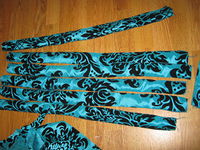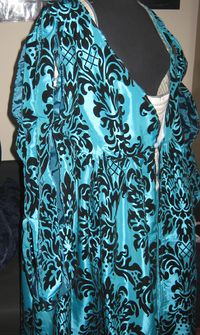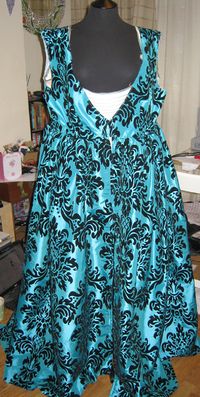A League costume diary 2
| Line 92: | Line 92: | ||
[[File:Jess8.jpg|200px|thumb|left]] | [[File:Jess8.jpg|200px|thumb|left]] | ||
[[File:Jess9.jpg|200px|thumb|left]] | |||
Revision as of 17:45, 10 December 2012
A Lady's Gown
by Jessica Townshend
Part 1 - Design and planning
What sort of person is my character going to be?
This dress is intended to serve two characters - first a fairy NPC at Masquerades and Massacres, and the second as an Empire character (yet to be fully realised). The key concepts uniting the two are a need for an elegant and impressive presence. What really appeals to be about making costume for Empire and the League specifically is the separation of political and combat arenas, so a character is free to express an extravagant and flamboyant side through their dress without having to make it battle ready.
What IC and OOC practical considerations do I need to take into account?
The train I will put in for M&M will have to be removed for Empire, and the skirt shortened, as events can be very muddy and we want to avoid bringing the dress back dripping wet every time it rains. The front closure is also designed to be adjustable in future, as the wearer is currently pregnant and will be breastfeeding.
What images from the media appeal to me that might help with my design?
Very few media images appeal, to be honest. I much prefer to reference historical source material and bring a creative interpretation to it, rather than adapt designs taht already have had a modern influence infused into them. Having said that, I made a few forays into Borgias costume diaries and archives, to make it clear in my head what the Empire design team intended, and look at a few options for sleeve designs.
Ready to Scribble?
Lizy provided me with a pencil sketch of what she envisioned for the M&M NPC and the design slowly drifted from this original concept as we searched for fabric and researched historical images. I feel the key thing with scribbles is not to be bound my them if you aren't trying to recreate a specific piece.
One of the most helpful tools for costume making I've recently been introduced to is Pinterest. While searching the internet for pictures, tutorials and dress diaries I've been able to collect any interesting finds into one resource that represents things with pictures. So much easier to work with than the old bookmarks list or myriad of open browser tabs. Even if you don't want to sign up for an account there are still lots of inspiration boards people have made for your to browse.
Breakdown - Layer by layer
The dress itself will be a front fastening affair that slips over all manner of underclothes. It won't take well to belt pouches and bags but these would be decidedly practical and so at odds with the fashion of the day. If carrying capacity is required pockets can be made to sit beneath the underskirt, a drawstring purse can be made from spare fabric or a chatelaine can be pinned to the bodice.
Underneath the dress an underskirt can be worn as a front panel where the skirt splits. This can have a decorative panel for contrast or be a single colour/print.
The lowest layer will be a square necked, drawstring chemise with huge sleeves to puff out the slashes in the dress sleeves. The bigger the better is a good motto for chemise making in the League.
For shape and support Lizy has a pair of 18th Century stays which provide a flat front in keeping with the League visual style. Alternatively a good bra will do the job if required.
In addition to the bits I'll be making Lizy has turned a vintage fur coat into a short cape and muff for the colder weather.
What have I got already?
Aside from the stays this is a scratch build.
So what do I need?
5 metres of fabric for the dress. 3 metres of white linen for the chemise. 1 metre of contrasting fabric for bodice and sleeve borders. 3 metres of lining fabric. More thread than I anticipate.
For the dress fabric Lizy chose a curtain fabric with a flock silk appearance. This was a light blue silk with raised velvet areas in a damask pattern in a contrasting black. Our colour scheme established we purchased a metre of black cotton velvet for borders. The most appealing aspect of the dress fabric was the textures at play which meant large areas of fabric would look visually appealing without the need for accessories and embellishments. I'm a real fan of texture in costuming.
The total cost of fabric was around £50.
Part 2 - Making it
Sewing with commercial patterns
When it comes to costume making I'm still very much a learner. No matter what I tired I just couldn't get the bodice right by drafting my own pattern. After searching the internet for a suitable bodice design we settled on the now discontinued McCalls pattern 2806 which we managed to locate on Etsy. With this starting point available I made a few tweaks to the bodice part of the pattern and discarded the rest as I'd already planned the sleeves and skirt.
Making the bodice
The bodice in the base pattern was designed to fit closely when closed but we needed this costume to be adjustable so I extended the edges to make it close like a wrap dress. To get this right I copied the pattern onto sheets of newspaper taped together where I was able to adjust the measurements as required before making a mock up out of cheap fabric we had lying around.
I always try to make a mock up before cutting expensive fabric, especially if I have done some alterations to a pattern. This allowed us to check the fit without cutting and wasting our nice dress fabric. Any adjustments needed could be drawn directly onto this mock up and transferred to newspaper once more to fiddle with. As luck would have it the mock up was fine so I used this as interlining (an extra layer of fabric between the outside and lining) because it's a shame to waste fabric when you don't need to.
When placing the pattern on the fabric I wanted to make sure the damask pattern was a part of the costume and not simply covering it. To this end I selected a particularly impressive part and made this the centre of the bodice back. This did mean I was less economical with the fabric as I couldn't place the bodice pattern in the corner of the fabric to reduce waste. Again it is a shame to waste fabric but the benefits of doing so in this case make it easily justifiable.
Drafting the sleeves
This was the most challenging part of the project as it was new ground and pushed my skills. I wanted to capture some of the most outrageous moments of Landsknecht/Tudor fashion and aimed far beyond my actual capabilities. What we ended up with was a compromise between my fantasies and practicality. I could happily create an entire article on making sleeves for League dresses but I'll stick to what I did for this entry.
To start I drafted some basic sleeves and ensured they had a comfortable fit. This was done on paper once more so I could happily cut up and mess around to get the right feel.
First step was to take off the tapered edges and create a rectangular core. The tapered edges where then placed together as they would when the sleeve was folded round. There would be no changes made to these tapered parts as they would sit against the bodice and I wanted them to be flat to ease arm movement and serve as a form to aid the puffs.
I then divided the rectangle up into equal bars. I settled for six 50mm wide strips but this would vary depending on your sleeve size and the desired amount of slashing. To create the puffs I then extended these strips by 20%. All the patterns were then made into tubes of dress fabric one side and lining fabric the other which I turned inside out to hide the seams.
Now came the tricky bit. I decided three puffs would look right so divided the tapered section into three. The tubes were then tacked at the ends to form a sleeve shape and I did some eyeballing to get the puffs right. I think a video tutorial is the best way to convey this. The key thing to remember is that the central tubes have to be longer at the top so they reach the top of the arm hole and still puff.
To give volume to the puffs the sleeves of the chemise will be extra big and the fabric pulled out through the slashes. In order to finish the sleeves I made cuffs and bands from the velvet to gather everything together.
Assembling the skirt
The central theme for the skirt was 'HUGE!' To achieve this I used the full width of the remaining fabric and managed to get three panels out of it. Again I wasted some fabric here as I wanted the pattern to continue around the skirt which meant losing some to ensure everything lined up correctly. The end result is very satisfying as the seams are lost in the folds and it looks like one continuous piece.
Essentially the skirt is just one long rectangle gathered to the bodice. For M&M the bottom of the central section was a semi circle to create a train but this will be removed for Empire as it is not fun to have fabric dragging in the mud or your dress being trodden on in crowds.
At just under 7000mm long this skirt needed pleating down to somewhere under 1000mm to fit the bodice. To do this I mentally divided each panel into four and gathered each of these quarters onto a loop of thread. I was then able to gather the skirt in twelve separate sections independently. By splitting the bottom of the bodice into twelve sections I was able to gather the skirt and pin it to the bodice in small and easy to manage segments before running it all through the machine a couple of times.
There are many choices for pleating but I settled on gathering in a cartridge pleat style as this creates a fuller puff and really makes a feature of the skirt. In the final dress this decision really pays off as there is no shape wear like a bum roll or panniers worn under it and it still gives a full skirt.
The Chemise
One of the most commonly overlooked aspects of larp costume is what you intend to wear under it. It's very tempting to stick with warm modern clothing underneath costume worn as a shell and in many cases this is absolutely fine. In this case the chemise forms an integral part of the costume forming the neck line under the bodice and providing the puff for the sleeves and will therefore be very visible.
There are lots of handy chemise tutorials all over the internet but if you are making one for your Empire kit I'd advise making it big. Like, real big. A drawstring square neck means the chemise will always fall right on your shoulders and the larger the sleeves and body the more stylish gathers and extravagant puff you will have. This is perhaps the best bit of kit to make as a beginner as you really don't need to worry about your measurements too much. If you cut the fabric right you can use the selvedges (the non-fraying edges at the side of your fabric) for the bottom of the chemise which will save you a job with hemming.
Part 3 - Putting it all together
Here we have the finished dress. The ruff is for M&M and will be absent for Empire. The sleeves of the chemise can be seen between the slashed sleeves of the dress and even though I made them huge they could happily do with being bigger. Notice how the contrasting theme of light blue and black is used throughout with no attempt to add further trim or accessories which would clutter the effect with the already busy pattern on the fabric.
I hope this has been an interesting read. Jess
